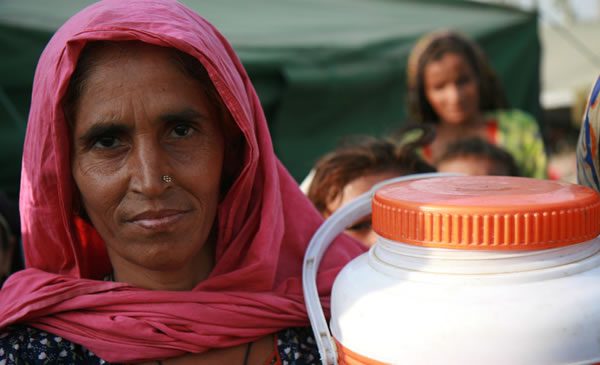
Photos and story by Jane Beesley/Oxfam
In the town of Dadu in Pakistan, Oxfam and local partners SAFWCO (Sindh agricultural forest workers co-ordination organisation), are providing water, sanitation and hygiene promotion, in several camps. Zarina and Janat, two women in one of the camps, talks to us about their experiences.
Before the flood Zarina and her family were farmers but when the flood came it destroyed everything. The family, with many others, had to leave to stay in camps and on roadsides. ‘There are twelve of us in my family. I have six daughters and four sons – two of my sons are married.’
Whilst some families have left and others are planning to leave soon Zarina reports that it could be some time before she and her family can return home. ‘It might be six months before we can return home because the water is still there. The last time someone went, which was a few days ago, the water was seven foot deep and they could only go there by boat. The land is water logged so that’s why it will take along time to dry.’ And with the onset of winter the process of drying out will take even longer.
Whilst life is hard in the camp and conditions are tough Zarina has taken on responsibility for the latrines she and her neighbours are using, ‘Six families are using these latrines.’ The latrines are basic but clean. When asked why they are so clean with so many people using them she replies, ‘If someone comes and uses them I come and check to see if they are clean. If they are not clean I don’t let them leave without cleaning it. I can’t use it if it’s not clean.’
She goes on to say, ‘We don’t have latrines like this at home…this is the first time we’ve had them. They’re good. I like them because they give us privacy and I’d like to have one when we go back home.’ Seeing that the hand washing station is getting low on water she fills it up, explaining whilst she does, ‘Normally my son keeps the water filled up but he’s away today so I’m doing it.’ And when asked where the soap is she explains, ‘We normally bring our own soap with us because if we leave it here someone else will take it.’
In a tent not far from Zarina is Janat. ‘There are thirteen of us in my family. We have eleven children, two sons and nine daughters’. Like Zarina they too were farmers before the flood but now, ‘We have nothing left and we have no resources back at home. I don’t know what we will do when we return.’
We’ve been here for two and a half months but we are hoping to return home in 10 days time after EID. We have no home left in the village…it went with the flood…so we need some kind of shelter as winter is coming.’
With few possessions Janat reports that when you have very little the hygiene kit has proved to be useful, ‘…there was a bucket, a cooler, soap for washing clothes, utensils and personal soap, towels, sanitary cloth. Getting this kit has made life easier for us. Before we had nowhere to store water so the cooler is very useful…but all the things are very important for us because we didn’t have these things and had no money to buy them.’
Oxfam’s water, sanitation and hygiene promotion in Dadu has been supported through UNICEF. So far Oxfam, with partner SAFWCO has:
- constructed 76 emergency latrines
- distributed 7,OOO hygiene kits
- provided hygiene promotion sessions that have reached 26,000 people
- provided safe drinking water to over 39,000 people through water tankering or handpumps
- Read more about our response to the Pakistan floods
- Make a donation to our Pakistan floods Appeal